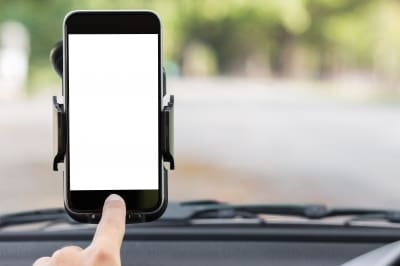
Unfortunately, more than 80 percent of the nation’s 94 million cell phone owners use them while driving (at least sometimes). Today, safe driving means knowing the rules around cell phone usage when driving. In the past few years, cell phone usage has been an issue in several lawsuits, and employers may be held responsible if a worker causes an accident while talking on the phone. In fact:
- Many states have legislation to regulate cell phone use while driving
- Cell phone records can be subpoenaed to prove the employee was on the phone when the accident occurred
Safe Driving & Cell Phone Usage: Policies & Training

So why aren’t employers more concerned about cell phone usage in vehicles? Interestingly, the distraction problem may not exist as much with two-way radios, which are as much a staple of contractors as cell phones because those calls are usually much shorter. However, some states that ban handheld phones may consider two-way radios in the same manner so you should check with your state’s regulations on the use of two-way radios.
While there is no guaranteed defense to liability, developing appropriate policies, training and enforcement mechanisms can help limit potential liability including:
- Prohibit employees from using cell phones while driving on company time
- Adopt cell phone safety guidelines and focus on training and enforcement
- Direct employees to comply with all state and local laws governing cell phone use
- Require employees to pull over to the side of the road to take phone calls
- Prohibit cell phone use in adverse weather or difficult traffic conditions
- Prohibit texting, reading or writing while operating the vehicle
Each company should determine whether the benefits of employee cell phone use outweigh the risk.
Safe Driving & Cell Phone Usage: Establish a Written Policy
To protect themselves, companies should consider establishing a written policy restricting any use of a cell phone incorporating some or all of the above suggestions and ensure employees read and sign the written policy.
After an accident, the other driver’s attorney usually tries to obtain the driver’s cell phone records. The attorney will be attempting to prove negligence on the part of the landscaper so he or she can seek recovery from the employer.
One of the issues that all fleet owners need to consider is that depending on the state and circumstances of the claim, if gross negligence or other severe conduct is proven, the award from the court may include punitive damages. By law, several states will not allow your automobile insurance carrier to pay the punitive damages portion of an award. There is a theory that punitive damages are meant to punish people for their bad acts. Therefore, it’s against public policy for someone to avoid the consequences of their “bad acts.”
EDITOR’S NOTE: NALP has partnered with 12-time National Best Practices Agency, Rancho Mesa Insurance Services, Inc. and Axis Insurance Company to offer a general liability program specifically for NALP member companies. Learn more. Axis Insurance provided these safe driving and cell phone usage tips.
Looking for more tips to help your crews perform better in the field? Attend LANDSCAPES!

